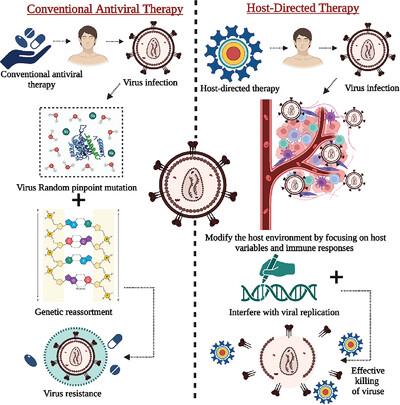Achieving Optimal Health With Host‐Directed Therapies (HDTs) in Infectious Diseases—A New Horizon
IF 3.7
4区 医学
Q2 PHARMACOLOGY & PHARMACY
引用次数: 0
Abstract
Host‐directed therapies (HDTs) have emerged as a promising strategy to combat viral infections by modifying host factors and immune responses to restrict viral replication and improve patient outcomes. This review summarizes the latest advances and future potential of HDTs in antiviral therapy. With developments in genomics and proteomics, new host targets essential for viral replication have been identified. Gene‐editing tools, such as CRISPR‐Cas9, enable precise manipulation of host genes linked to viral processes, paving the way for innovative HDTs. Emerging approaches, including RNA interference and viral interference, further demonstrate the potential to specifically modify host factors to inhibit viral replication. Additionally, probiotics are being explored for their capacity to enhance immune responses and modulate gut microbiota, offering a natural and safe method for boosting antiviral defenses. Despite these advancements, significant challenges remain, particularly in deciphering complex host–virus interactions and ensuring the safety and efficacy of these therapies. Continued research and clinical evaluation are essential to realize the full potential of HDTs. This review provides a comprehensive overview of current HDT strategies, emphasizing their promise in shaping future antiviral interventions.

用宿主引导疗法(HDTs)治疗传染病,实现最佳健康状态--新视野
宿主导向疗法(HDTs)通过改变宿主因素和免疫反应来限制病毒复制并改善患者预后,已成为抗病毒感染的一种前景广阔的策略。本综述总结了 HDT 在抗病毒治疗中的最新进展和未来潜力。随着基因组学和蛋白质组学的发展,人们发现了对病毒复制至关重要的新宿主靶点。CRISPR-Cas9等基因编辑工具能够精确操纵与病毒过程相关的宿主基因,为创新的HDT铺平了道路。包括 RNA 干扰和病毒干扰在内的新兴方法进一步证明了特异性改变宿主因子以抑制病毒复制的潜力。此外,人们还在探索益生菌增强免疫反应和调节肠道微生物群的能力,为增强抗病毒防御能力提供了一种天然、安全的方法。尽管取得了这些进展,但仍然存在重大挑战,特别是在破译复杂的宿主-病毒相互作用以及确保这些疗法的安全性和有效性方面。持续的研究和临床评估对于充分发挥 HDT 的潜力至关重要。本综述全面概述了当前的 HDT 策略,强调了它们在塑造未来抗病毒干预措施方面的前景。
本文章由计算机程序翻译,如有差异,请以英文原文为准。
求助全文
约1分钟内获得全文
求助全文
来源期刊

Advanced Therapeutics
Pharmacology, Toxicology and Pharmaceutics-Pharmaceutical Science
CiteScore
7.10
自引率
2.20%
发文量
130
 求助内容:
求助内容: 应助结果提醒方式:
应助结果提醒方式:


